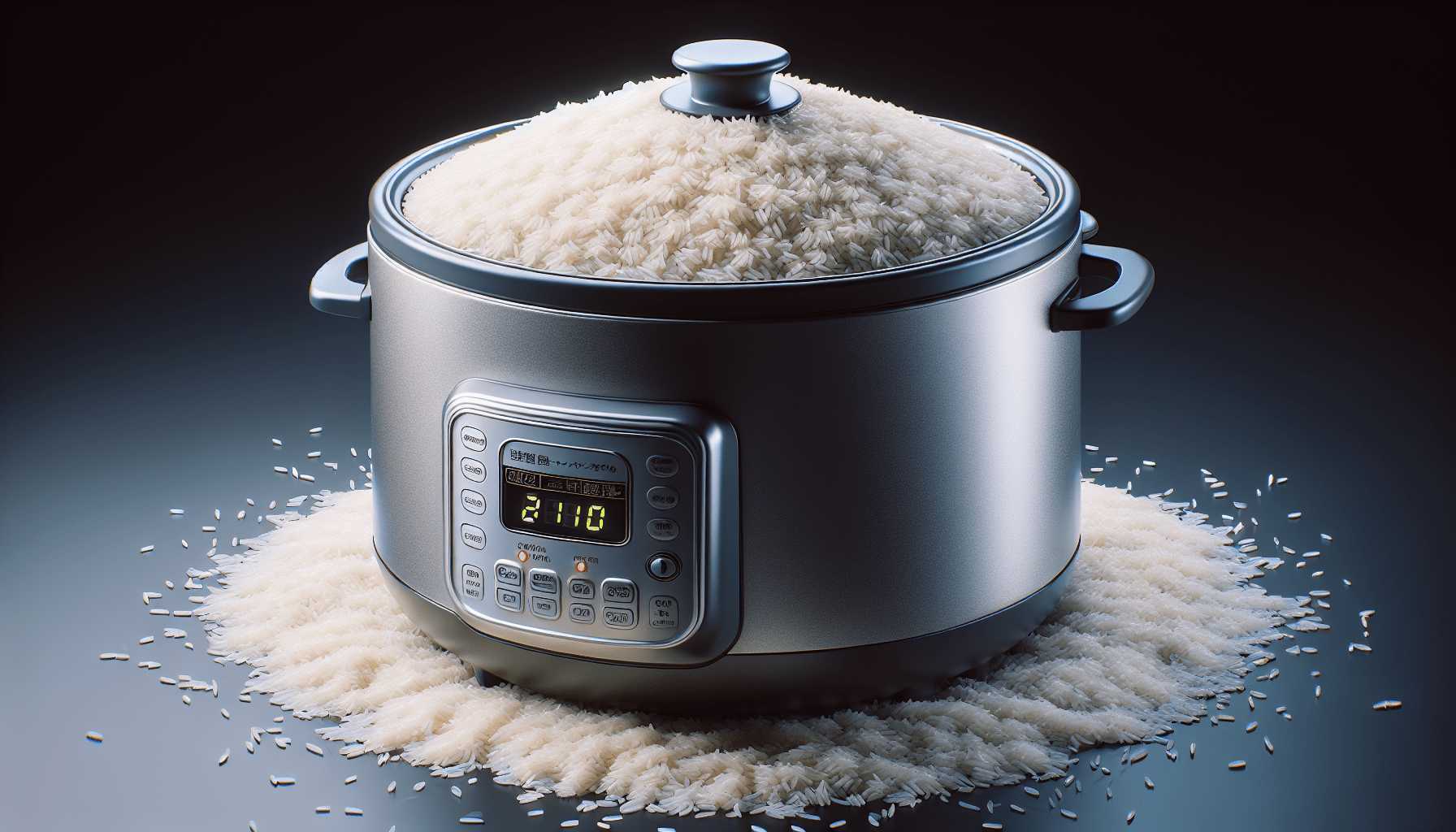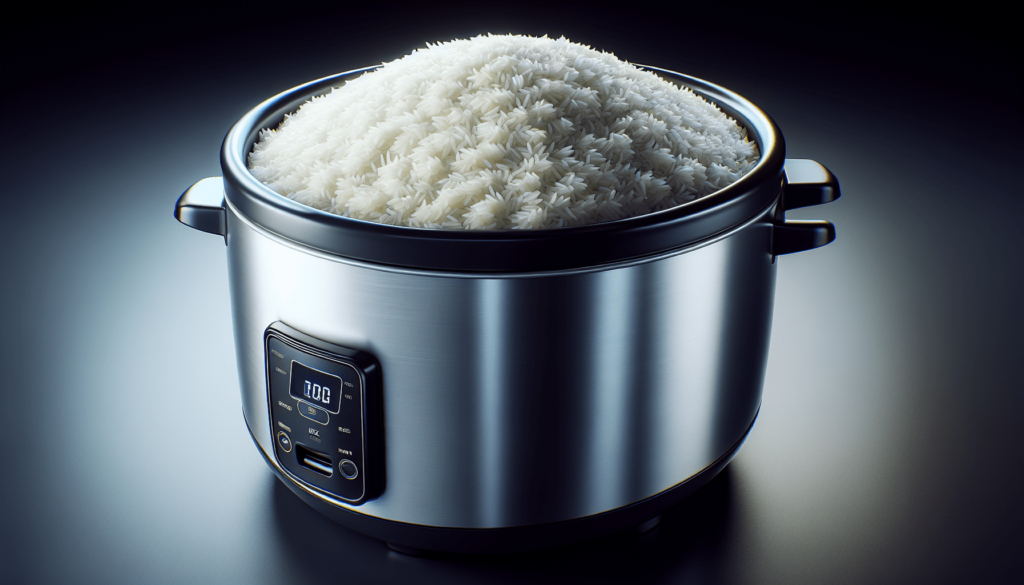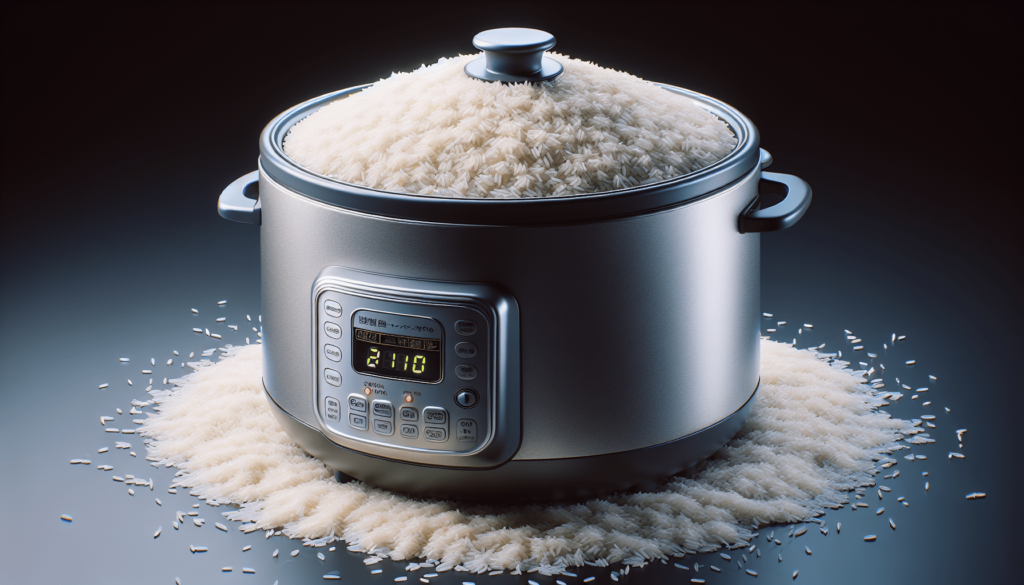
If you’re looking to upgrade your kitchen arsenal or simply wondering what size rice cooker would be perfect for your family of three, look no further! In this detailed breakdown, we’ll explore the options and considerations to help you find the ideal rice cooker size for your household. So whether you’re a novice cook or a seasoned pro, let’s dive right in and discover the perfect fit for your culinary adventures!

Understanding the basics of a rice cooker
How a rice cooker works
A rice cooker is a kitchen appliance specifically designed to cook rice quickly and easily. It operates by utilizing a combination of heat and moisture to cook the rice thoroughly and evenly. The basic principle behind a rice cooker is that it uses an electric heating element to heat the bottom of the cooking pot, which in turn transfers the heat to the rice and water mixture. As the water reaches its boiling point, it turns into steam, and the rice absorbs this steam, resulting in perfectly cooked rice.
Different types of rice cookers
There are several types of rice cookers available in the market, each with its unique features and functionalities. The most common types include conventional rice cookers, fuzzy logic rice cookers, and pressure rice cookers. Conventional rice cookers are the simplest and most affordable type, relying on a basic on-off mechanism. Fuzzy logic rice cookers, on the other hand, employ advanced microprocessor technology to adjust cooking times and temperatures according to the type of rice being cooked. Lastly, pressure rice cookers combine pressure and heat to cook rice faster while maintaining its flavor and texture.
The main components of a rice cooker
The main components of a rice cooker include the cooking pot, the heating element, the thermostat, and the timer. The cooking pot is typically made of non-stick material to prevent the rice from sticking and burning. The heating element is responsible for generating the heat needed to cook the rice. The thermostat regulates the temperature inside the rice cooker, ensuring that the rice is cooked evenly without getting overcooked or undercooked. Finally, the timer allows you to set the cooking time according to your preference and requirements.
Determining the capacity of a rice cooker
What does capacity mean in a rice cooker?
The capacity of a rice cooker refers to the amount of cooked rice it can hold. It is typically measured in cups and can vary from one model to another. Understanding the capacity of a rice cooker is crucial as it allows you to determine the right size that can meet your needs.
How rice cooker capacity is measured
Rice cooker capacity is measured by the number of cups of uncooked rice it can accommodate. A general rule of thumb is that 1 cup of uncooked rice will yield approximately 2 cups of cooked rice. Therefore, if you plan to cook 3 cups of uncooked rice, you would need a rice cooker with a capacity of at least 6 cups.
Differentiating between uncooked and cooked rice capacity
It is important to note the difference between uncooked and cooked rice capacity. Some rice cookers specify their capacity based on uncooked rice, while others indicate the capacity based on cooked rice. Be sure to check the product specifications to determine which measurement is being used to avoid any confusion.
How much rice does each person need?
The average amount of rice usually consumed per person
On average, a person consumes approximately 1/2 to 1 cup of cooked rice per meal. However, this can vary depending on various factors such as individual appetite, dietary preferences, and cultural habits.
Variables that can affect rice consumption per person
Several variables can affect the amount of rice consumed per person. These include age, gender, activity level, and overall diet. For example, athletes or individuals with higher caloric needs may consume more rice than those with sedentary lifestyles.
The difference in rice serving size for adults and children
When determining the rice serving size for adults and children, it is important to consider their differing appetites and nutritional requirements. Generally, adults would require a larger serving size compared to children. However, it is always best to take into account individual preferences and adjust accordingly.

Rice cooker sizes for 3 people
Recommended rice cooker sizes for 3 adults
For a family of three adults, a rice cooker with a capacity of 6 to 8 cups of cooked rice would be suitable. This would generally provide enough rice for each person’s serving as well as some leftovers if desired.
Recommended rice cooker sizes for 2 adults and 1 child
In the case of a family consisting of two adults and one child, a rice cooker with a capacity of 4 to 6 cups of cooked rice should be sufficient. This size allows for smaller portions while still accommodating the needs of all family members.
Recommended rice cooker sizes for 3 children
If the family consists of three children, it is advisable to opt for a rice cooker with a larger capacity. A cooker capable of cooking 8 to 10 cups of cooked rice would ensure an ample supply to meet the hunger of growing children.
Other factors to consider when choosing a rice cooker size
Factors in the type of rice used
The type of rice being cooked can also influence the choice of rice cooker size. Different types of rice have varying cooking times and absorption levels, which can affect the final quantity of cooked rice. For example, long-grain rice may require more water and produce a larger volume compared to short-grain rice.
Importance of considering meal frequency and leftovers
When choosing a rice cooker size, it is essential to consider the frequency of rice consumption and the preference for leftovers. If rice is a staple in your household and you enjoy having leftovers for future meals or quick lunches, opting for a larger rice cooker would be advantageous.
Taking into account space for cooking other dishes in the rice cooker
Some rice cookers come with additional features that allow for cooking other dishes simultaneously. If you intend to utilize your rice cooker for preparing complete meals, it is worth considering a larger size to accommodate both the rice and other ingredients.
Benefits of having a larger rice cooker
Advantages of flexibility in cooking different portions
One of the significant benefits of having a larger rice cooker is the flexibility it offers in cooking different portions. With a larger capacity, you can effortlessly adjust the quantity of rice cooked depending on your needs, whether it’s for a small family dinner or a large gathering.
Improvements in cooking quality with adequate space
Having adequate space in the rice cooker allows for even heat distribution and proper steam circulation, resulting in improved cooking quality. The rice is more likely to come out evenly cooked, fluffy, and free from uncooked or sticky portions.
Increased usefulness for dinner parties or larger gatherings
A larger rice cooker can be extremely useful when hosting dinner parties or larger gatherings. It eliminates the need for multiple batches of rice and ensures that there is enough rice to serve everyone simultaneously, thus making the meal preparation process more efficient and enjoyable.
Drawbacks of having a larger rice cooker
Potential wastage of electricity
One of the drawbacks of owning a larger rice cooker is the potential wastage of electricity. When using a larger cooker to prepare smaller portions, it may require more energy to heat the larger cooking pot, leading to unnecessary energy consumption.
Increased counter space requirement
A larger rice cooker naturally takes up more counter space in the kitchen. If you have limited kitchen space, this may pose a challenge, especially if you already have other appliances or cookware occupying the area.
Difficulty in cooking smaller portions effectively
While a bigger rice cooker offers flexibility in cooking larger quantities, it may not perform as effectively when cooking smaller portions. The smaller amount of rice may not distribute heat evenly, potentially resulting in unevenly cooked rice or a more challenging cleaning process.
Maintaining a rice cooker
Regular cleaning routines
Proper maintenance and regular cleaning of your rice cooker are essential to ensure its longevity and optimal performance. After each use, allow the cooker to cool down before cleaning. Remove the cooking pot and wash it with warm, soapy water. Wipe the exterior of the cooker with a damp cloth and ensure that all removable parts are thoroughly dried before reassembling.
Maintenance tips to extend the life of your rice cooker
To extend the life of your rice cooker, it’s important to follow a few key maintenance tips. Avoid using metal utensils or abrasive cleaners that may scratch the non-stick surface of the cooking pot. Also, periodically check the power cord for any signs of damage and ensure that it is properly connected. If you notice any issues, consult the manufacturer’s instructions for appropriate repair or replacement.
Replacement of faulty parts
If any components of your rice cooker become faulty or unusable, it is advisable to replace them promptly to maintain optimal performance. Contact the manufacturer or authorized service centers for genuine replacement parts and follow the instructions provided for safe installation.
Recommended rice cookers for 3 people
Review of top rice cooker models suitable for 3 people
When considering the purchase of a rice cooker for three people, several top models stand out. These include the Zojirushi NS-ZCC10, the Instant Pot Duo Plus, and the Tiger JNP-S10U-HU. Each of these models offers excellent performance and features that cater to the needs of a family of three.
Breakdown of the features of each recommended model
The Zojirushi NS-ZCC10 is a versatile rice cooker that utilizes fuzzy logic technology for precise cooking and has a capacity of up to 5.5 cups of cooked rice. The Instant Pot Duo Plus is a multi-purpose cooker that combines the functions of a rice cooker, pressure cooker, and slow cooker, offering a capacity of 6 cups of cooked rice. The Tiger JNP-S10U-HU is a traditional rice cooker with a capacity of 5.5 cups of cooked rice and features a simplistic design and easy-to-use functionality.
A comparison of prices and warranties of different models
Prices and warranties of rice cooker models can vary depending on the brand and features. The Zojirushi NS-ZCC10 is priced around $180 and comes with a 1-year warranty, while the Instant Pot Duo Plus is priced at approximately $120 and includes a 1-year warranty. The Tiger JNP-S10U-HU is priced around $130 and also includes a 1-year warranty. It is advisable to compare prices and warranty terms to make an informed decision based on personal preferences and budget constraints.
Conclusion
Summary of the key points discussed
In summary, understanding the basics of a rice cooker, determining the capacity needed for a specific number of people, and considering various factors are crucial in choosing the right rice cooker size. Benefits of having a larger rice cooker include flexibility in cooking portions, improved cooking quality, and usefulness for larger gatherings. However, potential drawbacks include potential wastage of electricity, increased counter space requirements, and difficulty in cooking smaller portions effectively. Maintaining a rice cooker through regular cleaning routines, following maintenance tips, and replacing faulty parts when necessary is essential for its longevity. Several recommended rice cookers for three people were reviewed, and a breakdown of their features and prices was provided to assist in making an informed purchasing decision.
Personal advice on choosing the right rice cooker size
When choosing the right rice cooker size for three people, consider the average rice consumption per person, the age and appetite differences, and the need for leftovers. Taking into account the type of rice used, meal frequency, and the ability to cook other dishes in the rice cooker can also help in determining the appropriate size. It is advisable to opt for a larger rice cooker if you often entertain or have larger gatherings, as it offers greater flexibility and convenience.
Final thoughts and recommendations
Ultimately, the choice of a rice cooker size depends on individual preferences and needs. It is recommended to assess your specific requirements, budget constraints, and available kitchen space before making a purchase. By considering the information and factors discussed in this article, you will be able to make an informed decision and choose the right rice cooker size to suit your needs. With a quality rice cooker that meets your requirements, you can enjoy perfectly cooked rice effortlessly and enhance your culinary experience.